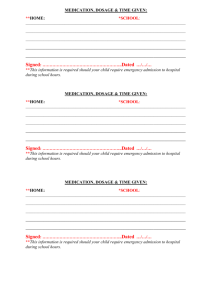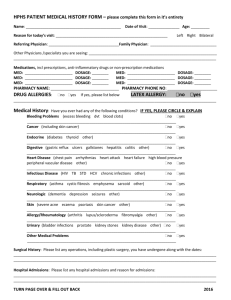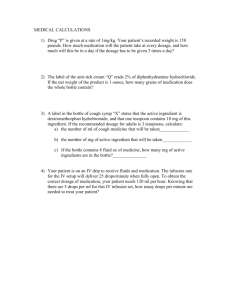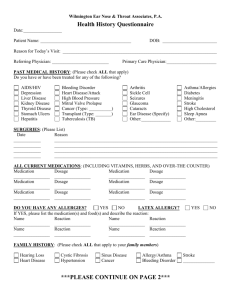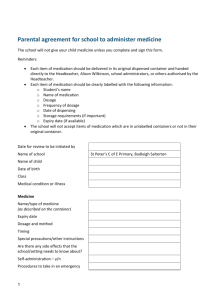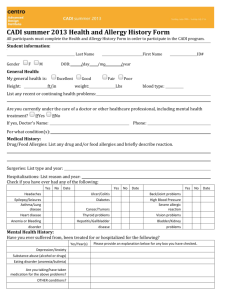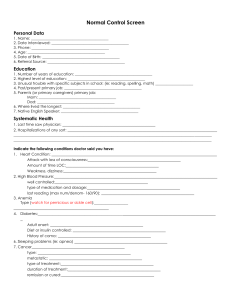Math Questions - De Anza College
advertisement
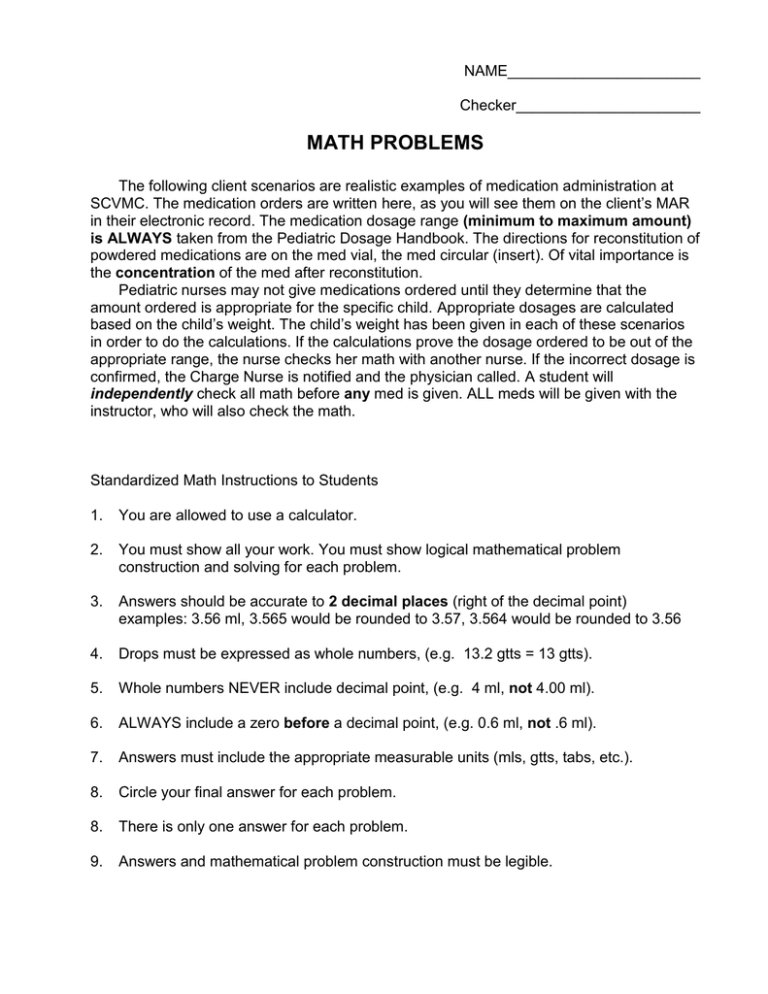
NAME_______________________ Checker______________________ MATH PROBLEMS The following client scenarios are realistic examples of medication administration at SCVMC. The medication orders are written here, as you will see them on the client’s MAR in their electronic record. The medication dosage range (minimum to maximum amount) is ALWAYS taken from the Pediatric Dosage Handbook. The directions for reconstitution of powdered medications are on the med vial, the med circular (insert). Of vital importance is the concentration of the med after reconstitution. Pediatric nurses may not give medications ordered until they determine that the amount ordered is appropriate for the specific child. Appropriate dosages are calculated based on the child’s weight. The child’s weight has been given in each of these scenarios in order to do the calculations. If the calculations prove the dosage ordered to be out of the appropriate range, the nurse checks her math with another nurse. If the incorrect dosage is confirmed, the Charge Nurse is notified and the physician called. A student will independently check all math before any med is given. ALL meds will be given with the instructor, who will also check the math. Standardized Math Instructions to Students 1. You are allowed to use a calculator. 2. You must show all your work. You must show logical mathematical problem construction and solving for each problem. 3. Answers should be accurate to 2 decimal places (right of the decimal point) examples: 3.56 ml, 3.565 would be rounded to 3.57, 3.564 would be rounded to 3.56 4. Drops must be expressed as whole numbers, (e.g. 13.2 gtts = 13 gtts). 5. Whole numbers NEVER include decimal point, (e.g. 4 ml, not 4.00 ml). 6. ALWAYS include a zero before a decimal point, (e.g. 0.6 ml, not .6 ml). 7. Answers must include the appropriate measurable units (mls, gtts, tabs, etc.). 8. Circle your final answer for each problem. 8. There is only one answer for each problem. 9. Answers and mathematical problem construction must be legible. NAME ____________________________ #1. ORDER: Ampicillin 190 mg IV q6h Range for infants & children: 100-200 mg/kg/day in 4-6 divided doses Vial: 500mg Label states: add 1.8 ml SW for a concentration of 250 mg/ml Client: 5.8 kg infant 1. How much med is child receiving in one day ____________mg 2. What is the appropriate dosage range? __________mg/d - __________mg/d 3. Is an appropriate amount of medication ordered for this child? ___________ Answer all following questions, regardless if dosage appropriate 4. Amount of diluent (sw/ns) to draw up? _______ml 5. Amount of med to draw up after reconstitution? _______ml #2 ORDER: Gentamicin 64 mg IV q12h Range: 2.5 mg/kg/dose q 8-12h Vial: 2 ml vial, already fluid Label states concentration is 40 mg/ml Client: 6 yr. old 48 lbs 1. How much med is child receiving in one day? _____mg 2. What is the appropriate dosage range? _____ mg/d - ______mg/d (q 12h) (q 8h) 3. Is an appropriate amount of medication ordered for this child? _____ Answer all the following questions, regardless of dosage appropriate 4. Amount of med to draw up? ______ ml 5. How many vials do you need? ______? #3 ORDER: Vancomycin 400 mg IV q6h Range for infants > 1 mo. & children: 40 mg/kg/day in divided doses q6h Vial: 500 mg Circular states add 10 ml SW, resulting concentration is 50 mg/ml Client: 10 yr. old, 88 lbs. 1. How much med is child receiving in one day? _____ mg 2. What is the appropriate dosage range? _____ mg/d - _____mg/d 3. Is an appropriate amount of medication ordered for this child? _____ Answer all following questions, regardless if dosage appropriate 4. Amount of diluent (sw/ns) to draw up? ______ ml 5. Amount of med to draw up after reconstitution? ______ ml #4 ORDER: Cefuroxime 510 mg IV tid Range for children: 75 – 150 mg/kg/day Vial: Zinacef (Cefuroxime) 750 mg Circular states add 8 ml diluent for a concentration of 90 mg/ml Client: 20 kg child 1. How much med is child receiving in one day? _____ mg 2. What is the appropriate dosage range? ______ mg/d - ______ mg/d 3. Is an appropriate amount of medication ordered for this child? ______ Answer all following questions, regardless if dosage appropriate 4. Amount of diluent (sw/ns) to draw up? ______ ml 5. Amount of med to draw up after reconstitution? ______ ml MEDICATION ORDERS How much would you give? Circle your answer. 1. Nafcillin IV 250 mg (250 mg/2 cc) 2. Cefotaxime IV 250 mg (95 mg/1 cc) 3. Ceftriaxone 550 mg q 24º (280 mg/cc) 4. Nafcillin 175 mg IV q 6º (250 mg/cc) 5. Phenergan IV 6 mg on call (10 mg/1 ml) 6. Cefotan 350 mg IV q 8º (95 mg/1 cc) 7. Ampicillin 190 mg IV q 12º (125 mg/1 cc) 8. Gentamicin 9.2 mg IV q 12º (10 mg/1 cc) 9. Ceftazidime 800 mg IV q 6º (100 mg/1 cc) 10. Zinacef 150 mg IV q 8º (200 mg/1 cc) 11. Ampicillin 250 mg IV q 6º (250 mg/1 cc) 12. Gentamicin 25 mg IV q 8º (20 mg/1 cc) 13. Tobramycin Sulfate 65 mg IV q 8º (130 mg/1cc) 14. Ceftazidime 800 mg IV q 8º (100 mg/1cc) 15. Reglan 0.5 mg IV q 8º (5 mg/1 cc) 16. Gentamicin 7 mg IV q 8º (20 mg/2 cc) 17. Ampicillin 150 mg IV q 8º (250 mg/1 cc) 18. Penicillin G 250,000 IV q 6º (100,000 units/1 ml) 19. Phenobarbital 30 mg po/ IV q AM (130 mg/1 ml) 20. Cefotaxime 350 mg IV q 8º (95 mg/1 cc)
